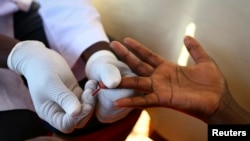Uganda is short of imported drugs to treat HIV victims because of a weak currency and insufficient foreign exchange, but the government is raising funds to cover the shortfall, a senior finance ministry official said.
Health activists say about 240,000 patients on publicly funded treatment programs are at risk because of the shortage, forcing them to take lower dosages or none at all.
Some activists said they were concerned that the government was spending too much on measures designed to help them win presidential and parliamentary elections in February, rather than on medicines. Officials denied the charge.
In Uganda about 1.5 million people, or about 4 percent of the population, is living with the human immunodeficiency virus, of which about 820,000 receive antiretroviral therapy drugs that help prevent the infection from turning into full-blown AIDS.
"We're preparing to secure a loan of $200 million and we hope that will be able to plug the funding gap," Finance Ministry Permanent Secretary Keith Muhakanizi told Reuters, denying the state was neglecting HIV victims.
He said the depreciation of Uganda's shilling currency, which has lost almost 19 percent of its value against the dollar this year, had caused problems with financing drug imports.
Activists said the government had failed to release enough funds in the last quarter of 2016, leading to shortages that affect not only those taking the drugs but also those waiting to start treatment.
Alice Kayongo Mutebi, a regional policy and advocacy manager at AIDS Healthcare Foundation, said "drug holidays" — when a patient stops taking prescribed medication — could spur the development of drug-resistant HIV strains.
"Is government neglecting key priorities like health, education and procurement of lifesaving commodities, splurging instead on [election] campaigns?" asked Asia Russell, Uganda-based executive director at Health GAP, an HIV advocacy group.
Activists called for a protest this week to highlight the problem, but police banned it. One officer said it was not necessary "since government is aware of the problem."
Uganda's President Yoweri Museveni, in office for nearly 30 years, and his ruling party are expected to sweep the polls in February, although he faces tougher competition than before.




